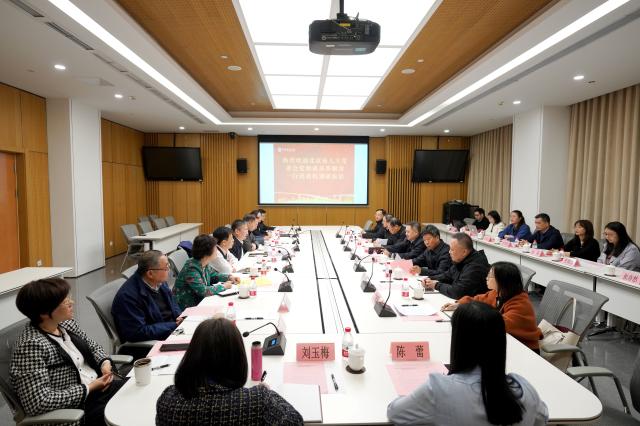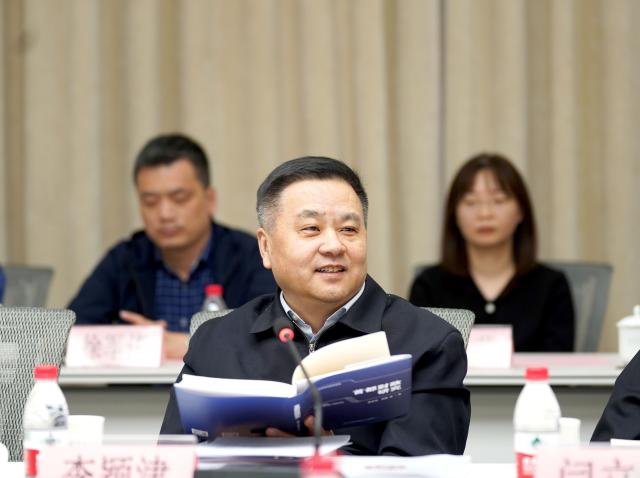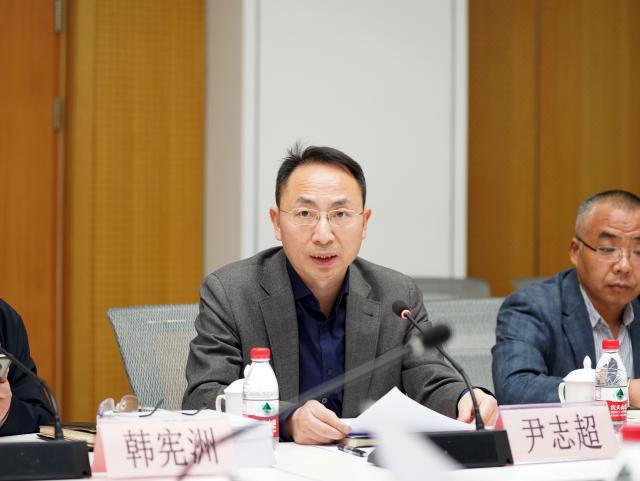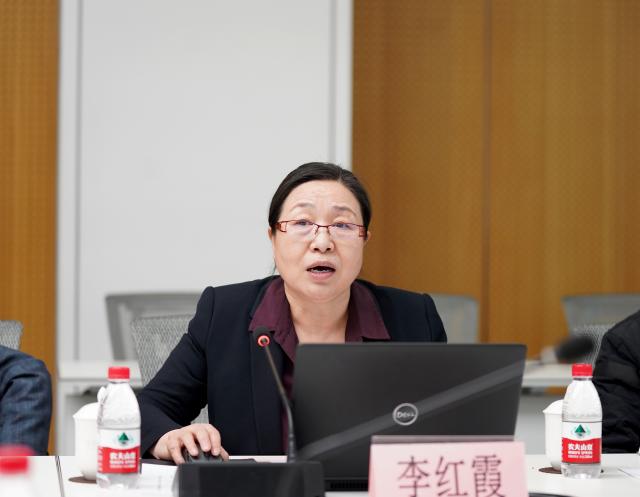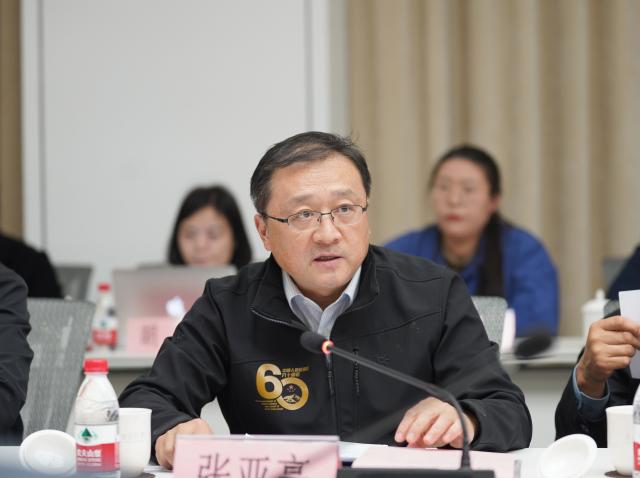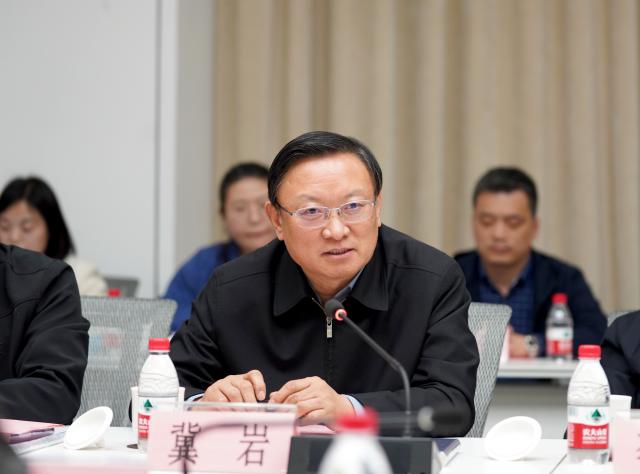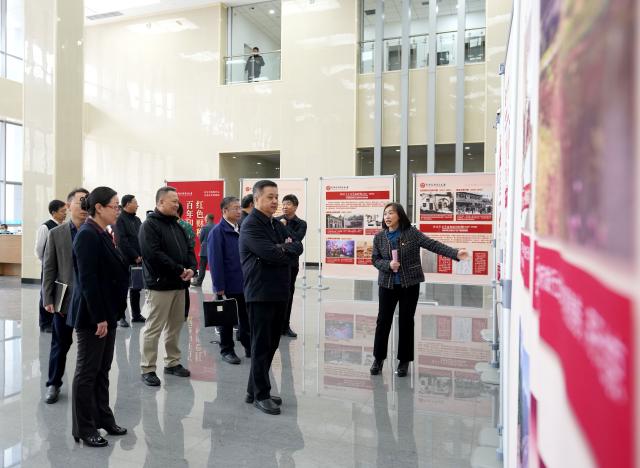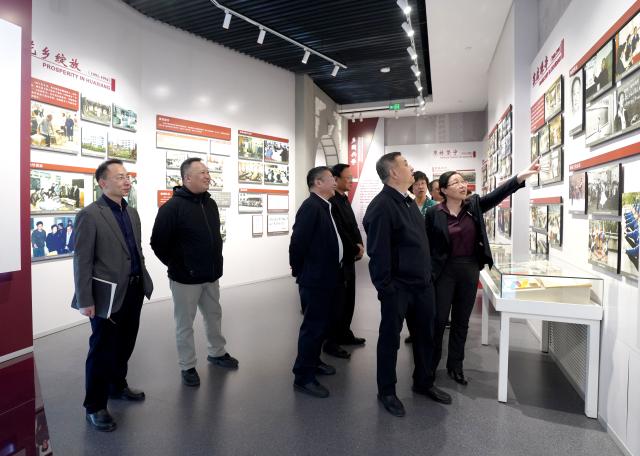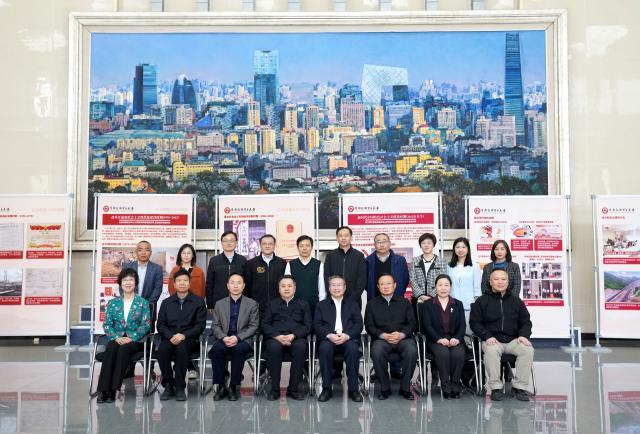Li Yingjin, Member of the Leading Party Members Group of SCBMPC, Visits CUEB
On the afternoon of April 3, Li Yingjin, member of the Leading Party Members Group of the Standing Committee of Beijing Municipal People’s Congress (SCBMPC), and his team visited CUEB. The two sides communicated about the operation and achievements since the foundation of Beijing Municipal People’s Congress Budget Oversight Research Base (the Base for short) and future development plans. Han Xianzhou, Party Secretary of CUEB, Yin Zhichao, member of Standing Committee of CUEB Party Committee and Vice President, Li Hongxia, Dean of the School of Public Finance and Taxation and Director of the Base, He Qing, Professor of the School of Public Finance and Taxation and Deputy Director of the Base, Yu Peng, Deputy Dean of School of Accounting and Deputy Director of the Base, and Liu Ying, Professor of School of Public Finance and Taxation attended the symposium. The symposium was presided over by Yan Ligang, Chairperson of the Financial and Economic Affairs Committee of SCBMPC and Director of the Finance and Economic Affairs Office.
Li Yingjin recognized the team development and research findings since the foundation of the Base. He extended appreciation to the leaders and teachers for their commitment. Then, he put forward three requirements for the work ahead.
First, the Base should summarize the development experience in the past five years and make the development plan for the next five years.
Second, the Base should put more efforts into research on special projects. Li remarked that the special projects in the Base over the past years were distinctive, outstanding, and competitive. Relevant findings were recognized by provincial and ministerial leaders. CUEB was a main contributor in transforming these findings to practice compared with other universities in Beijing. In the future, the Base shall lift special projects to new heights and make further efforts on sustainable and high-grade, precision, and advanced research.
Third, the Base should carry out more pragmatic project research ahead that is integrated with teaching and research, to serve as a think tank and an advisor for SCBMPC. Meanwhile, SCBMPC will build cooperative platforms for CUEB to provide better education, develop disciplines and increase its influence.
Han Xianzhou warmly welcomed Li Yingjin and his team and recognized the Base’s achievements. Han pointed out that the Base pooled multidisciplinary strengths, meeting the needs of the Beijing Municipal People’s Congress (BMPC). The Base have completed many projects to support BMPC deputies to fulfill their duties and supervise budget, thus contributing to building budget review and oversight of people’s congresses and developing “Beijing Model” featured whole-process people’s democracy. The 20th National Congress of the Communist Party of China put forward the strategic task of improving modern budget system. Thus, the Base must leverage the strengths of resources, academy, and practice to serve Beijing and make more outstanding achievements.
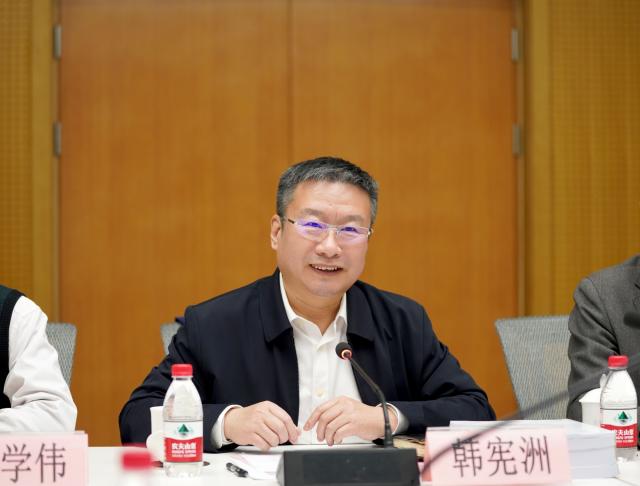
Yin Zhichao introduced CUEB’s development of the think tank in serving the capital’s economy in terms of its construction, research findings, and research characteristics. In an overview, CUEB has built a comprehensive think tank system with a variety of projects and significant research findings. Among the research findings, over 40 projects have received instructions from the Party and the country, over 30 projects from principal leaders of Beijing, and over 40 projects from other ministerial and provincial leaders. Out of nearly 1000 projects, over 200 projects directly met Beijing’s major strategic needs. Nearly 5000 papers have been published, and among the published books, over 120 are about Beijing. This Base as a think tank is featured with four characteristics: high political stance, defined goals of serving the country and Beijing, traceable research findings, and guaranteed quality of findings. In the future, Yin advised the think tank to follow the principles of “three strengthens and three upholds”, namely, to strengthen self-improvement, strengthen connections with central authorities, ministries and commissions, departments and primary-level governments in Beijing, and strengthen communication with think tanks in other universities. Meanwhile, it must uphold the principles of meeting the major strategic needs of China and Beijing, prioritizing quality, and pursuing practical findings.
Li Hongxia reported on the work, achievements, and blueprints of the Base. With the guidance of BMPC and the support of CUEB leaders, the Office of Research, and schools, the Base made the following four achievements since its foundation in September 2019.
First, multidisciplinary integration has been strengthened to serve the capital’s high-quality development. The Base coordinated the School of Public Finance and Taxation, School of Statistics, School of Accounting, School of Economics, and other schools to conduct nearly 20 budget oversight research and nearly 10 special research every year, offering insights into Beijing’s high-quality development. Relevant findings were adopted by the Financial and Economic Affairs Committee and the Budget Committee of SCBMPC.
Second, “Beijing Model” for budget oversight was built in the form of annual and quarterly audits in the guidance of “four questions”. For the first question “Should the money be spent on a certain area?” The answer is that the money should be spent on improving public wellbeing. For the second question “Should the government spend the money?” The answer is that financial expenditure should be public and fair and be spent more on public services. For the third question, “Should large amounts of money be spent?” The answer is that we should coordinate repeated expenditure. For the fourth question “Should the money be spent now?” The answer is that it should be spent on public wellbeing in need.
Third, the Base has developed a budget network oversight model and introduced big data into application.
Fourth, the Base exchanged its findings with others and put them into practice. It co-held symposia with the Central University of Finance and Economics and founded the National Budget Research Alliance with 15 universities. The Base held regular symposia with the Financial and Economic Affairs Committee and the Budget Committee of SCBMPC. Members of the Base worked as municipal and district-level deputies to people’s congresses. Meanwhile, the Base’s research findings were applied to teaching and research. Leveraging these findings, teachers received national and provincial approval for their projects, published high-quality papers, and won provincial and ministerial awards. Li expected that the Base would become local people congresses’ think tank and serve Beijing as the four centers (namely, national political center, cultural center, center for international exchanges, and center for scientific discovery and technological innovation) and its high-quality development in light of the Chinese and capital context.
Zhang Yaliang, Deputy Director of the Budget Committee of SCBMPC, introduced the work arrangements for the Base in 2023 in terms of legislative work, budget oversight and audit rectification work, including:
·Revising the Beijing Municipal Audit Regulations;
·Conducting annual and quarterly audits and follow-up research reports on audit rectification;
·Promoting the construction of financial network oversight platform of BMPC;
·Reviewing the working procedures of departmental budgets by the Budget Committee;
·Cooperating with the Financial and Economic Affairs Committee in the preliminary examination of departmental budgets;
·Revising the “four questions” manual (a guidance for budget oversight).
Besides, he also made specific arrangements for work requirements, deadlines, and the responsible personnel for each side.
During the discussion, Liu Ying, a professor of School of Public Finance and Taxation of CUEB, a deputy of the BMPC and a member of the Financial and Economic Affairs Committee of BMPC, shared three different research perspectives brought by her triple identity, working experience and feelings at the Base, and outlook for the future. Professor Yu Peng spoke glowingly of his rewards at the Base over the years and offered his views on the following work. Ji Yan, member of the SCBMPC, Deputy Director of the Financial and Economic Affairs Committee and Deputy Director of the Finance and Economic Affairs Office, expressed his appreciation for the development of CUEB and the achievements of the Base, and stated that he would fully support the research work of the Base in the future.
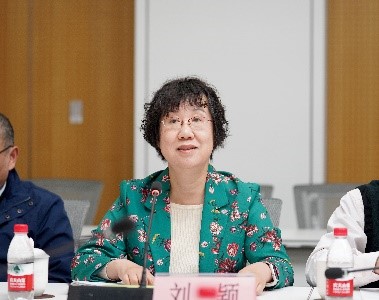
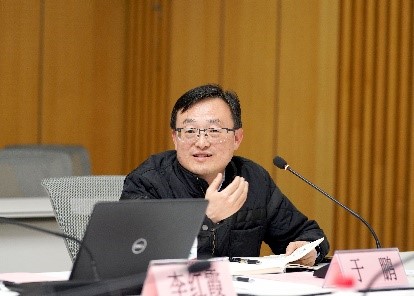
Before the symposium, Li Yingjin and his team visited the “Revolutionary Finance and Taxation Centennial Landmark” and the School History Museum, accompanied by Han Xianzhou, Yin Zhichao and other relevant leaders of CUEB.
Liu Xing, Director of the Budget Committee of SCBMPC and other relevant comrades attend the symposium, alongside with Fan Hejun, Deputy Director of the Office of Research of CUEB, and relevant teachers from the School of Public Finance and Taxation, the School of Accounting and the School of Statistics.
The Base was established on September 17, 2019 as a collaborative project between SCBMPC and CUEB. It has brought together the multidisciplinary strengths of the School of Public Finance and Taxation, the School of Statistics, the School of Accounting and the School of Economics to establish a reliable research team in finance, taxation, auditing and government big data analysis. Since its establishment, the Base, under the strong leadership of the Party Committee of CUEB and SCBMPC, has carried out research on various aspects, such as budget oversight of BMPC, fiscal and taxation policies, the application of big data for budget oversight, and key development issues in Beijing. It has undertaken nearly 60 projects commissioned by the Finance and Economic Affairs Office of BMPC, the Budget Committee and the Economic Department, and has held several significant academic seminars on budget oversight. Meanwhile, relevant research findings have been recognized many times by comrades Cai Qi, Chen Jining and Li Wei. Among the findings, Professor He Qing's “Four Questions” to Oversee the Budget of the BMPC was awarded the third prize for curriculum-based ideological and political education case by the China Teaching Guidance Committee for Public Finance Majors. In addition to being a “think tank” and a “pool” of personnel cultivation for SCBMPC, the Base also extends its intellectual resources support to the district-level people's congresses in Beijing. Going forward, the Base will continue to resonate with Beijing's development and contribute to a sounder system of budget oversight for BMPC by taking full advantage of its financial and economic strengths and multidisciplinary resources.

